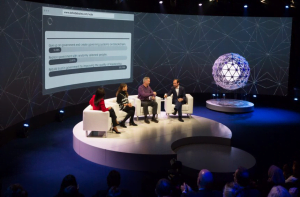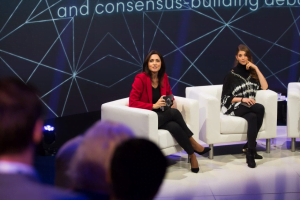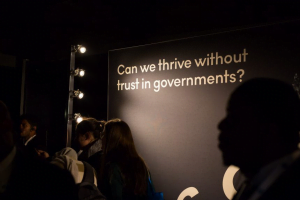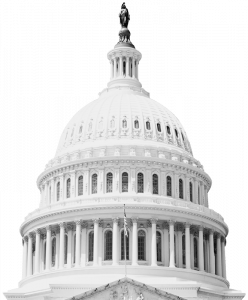Loss of Trust Debate Recap
by Caitlin PenzeyMoog
The wave of mass protests in Hong Kong, Chile, Lebanon, Ecuador and Iraq have more in common than just the courage, solidarity and turnout of millions of people: Citizens don’t trust their governments, and they’re taking to the streets to express mounting frustration and mobilize for change. Demands vary from country to country, but across the world people are fed up with governments’ failure to provide and protect basic rights — and with soaring inequality and anti-democratic systems.
The protests boil down to the loss of trust in the very institutions that claim to represent people. Studies put levels of distrust at anywhere from 50 to 75 percent of the world’s population. Widening wealth gaps and climate change contribute to the urgency of a global reckoning: How can countries function properly when corruption and monied interests disrupt democracy and stability? Can societies thrive without trust in nations’ leaders?
Enter our final debate of the year. At the Peace Forum in Paris, Doha Debates tackled the question of trust in governments. The most familiar proposal came from Prince Zeid Ra’ad al-Hussein, a diplomat and former United Nations High Commissioner for Human Rights. He said we must repair trust by improving the quality of leadership, especially among young people. Brett Hennig, co-founder of the Sortition Foundation and author of The End of Politicians: Time for a Real Democracy, argued for “citizens’ assemblies,” groups of randomly selected citizens who reflect their communities’ diversity and make decisions in place of elected politicians. The final speaker, Toni Lane Casserly, argued for blockchain technologies and rallied for a movement that transforms governments into networks of communities beyond borders, arguing that we should give up on conventional governments and create transnational, decentralized systems.
 Debate moderator Ghida Fakhry.
Debate moderator Ghida Fakhry.
Toni opened the debate by painting a grim picture but offered a hopeful solution: “Trust in government, or for that matter any major monolithic institution, is at an all-time low because these organizations fail to serve the people they’re meant to represent,” she said. “We have more power voting with our credit card than we do in a national election.”
She proposed blockchain technology because it promises “to eliminate middlemen who are gerrymandering trust out of the hands of individuals who need to own their own sovereign rights.” Blockchain technology could create a more humane world, she said, because it can be used anonymously or pseudo-anonymously and it relies on distributive social networks.
 Debate speaker Toni Lane Casserly.
Debate speaker Toni Lane Casserly.
“Any radical change that’s happened in society has not happened from the mainstream.”
—Toni Lane Casserly
Brett argued that the “folk theory of democracy” doesn’t work, that it assumes voters will read up on candidates’ positions and vote accordingly. He said governing bodies do not accurately represent citizens and instead drive down trust, and they’re best replaced by assemblies of randomly selected, representative citizens. It’s not a radical idea. Citizens’ assemblies have existed for decades across the world. They’re in use today: French President Emmanuel Macron created a citizens’ assembly in response to the wave of yellow vest protests. And the Scottish government, knowing its people wouldn’t trust it to voice their concerns about Brexit, created a citizens’ assembly to advise on Scotland’s Brexit proposal. We know citizens’ assemblies work, Brett argued, because they promote alternative self-governance in an era of historically low trust in conventional governments.
 Debate speaker Brett Hennig.
Debate speaker Brett Hennig.
“If our parliaments and legislatures were very differently selected, we wouldn’t have the problems we have now.”
—Brett Hennig
Zeid pushed back against Toni’s and Brett’s proposals to radically reimagine governance. “Sure, we can be attracted, seduced even, by revolutionary thinking,” he said, but Toni’s blockchain and Brett’s randomly selected representatives are not viable alternatives. What’s needed is incremental change, Zeid said, smaller steps that improve the governments we have. He highlighted the rising leadership of young people around the world, implying that if young people had voted in greater numbers in the United Kingdom and the United States, we might not have Brexit or President Donald Trump. Zeid implored young people to run for office. “What we need is the young, the courageous, the smart, the passionate people, not just to take part in elections but also to stand for political office, to lead.”
 Prince Zeid Ra’ad al-Hussein.
Prince Zeid Ra’ad al-Hussein.
“We cannot run countries on fear.”
—Prince Zeid Ra’ad al-Hussein
Moderator Ghida Fakhry pressed each speaker to clarify their arguments and explain how a decentralized blockchain would work, and who goes about picking citizens’ assemblies. She challenged Zeid’s incrementalism, pointing to the mass protests of people demanding radical change. “You want to change the players,” she said, while “Brett wants to change the players andthe game.”
“What I’m proposing is not little steps,” Zeid answered. “It’s actually the empowerment of young people to realize it’s their future. It’s not the future of people 65 and over. And the fact that in many countries the levels of apathy are high among youth, this is the problem that needs to change, and if they’re running for office and we’re seeing it in protests in many capitals around the world, things happen.”

Brett expanded on his proposal for citizens’ assemblies: “It’s not about replacing single individuals. It’s about randomly selecting a broadly representative bunch of people in an informed environment that’s deliberative.” He said it’s a misconception of citizens’ assemblies to think they’re uninformed. An educational phase, a deliberation phase, and a decision phase make these groups knowledgeable on the subject at hand, ensuring they become “experts who are on tap but not on top.”
The most hard-to-grasp vision was Toni’s. Blockchain technology, Ghida pointed out, is more in the realm of science fiction than reality. By a show of hands, most audience members didn’t know how blockchain technology worked. So Toni explained: “Blockchain is a distributed ledger that is owned and run by no one. There is no central authority.” She described the problem of governments defining personhood: A government can take away a person’s birth certificate and identity documents if officials don’t like the color of someone’s skin or religion, for example. In blockchain, there is no central authority, so a person’s status does not depend on the whims of government.
 Debate correspondent Nelufar Hedayat.
Debate correspondent Nelufar Hedayat.
The debate was livestreamed on Facebook, YouTube and Twitter, where viewers voted on speakers’ proposals and asked questions, announced by correspondent Nelufar Hedayat. The tweets expanded on the conversation and pointed to the need for governments to earn back the trust they’ve lost.
Govinda Clayton, the debate’s bridge-builder and “connector,” and a senior researcher in peace processes at the Center for Security Studies at ETH Zurich, focused on moving away from positions and toward underlying interests. The common thread between blockchains, citizens’ assemblies and incremental steps to rebuild trust is a fundamental agreement: Each wants to connect citizens with the centers of power.
 Debate connector Govinda Clayton.
Debate connector Govinda Clayton.
Audience polling at the beginning and end of the debate showed high engagement. Zeid took a strong lead early on, with 65 percent of the audience agreeing with his pitch for governments’ need to regain trust, while Toni’s blockchain vision got 10 percent and Brett’s citizen assemblies had 23 percent. The second poll showed Zeid still ahead, but Toni and Brett had gained ground.


Students asked powerful questions, one of which earned applause for pointing out the imbalance of women represented in governments and wondering which model would best represent women’s interests. Brett had a ready answer: Randomly selecting a group of representative people would ensure all demographics have proper representation through citizens’ assemblies.






The debate ended as constructively as it began, as a conversation, not a contest, and an example of how radically differing views can intersect to reveal shared values. Despite their divergent approaches, each speaker seemed to have a lot of trust in and respect for each other. “I think there’s a place for all of what we’ve heard,” Zeid acknowledged. “They’re not mutually exclusive.” The debate continues right now at @DohaDebates with the hashtag #DearWorld. We’ll see you there, and we’ll see you next year for more great Doha Debates in 2020.
Watch the entire debate
Loss Of Trust




